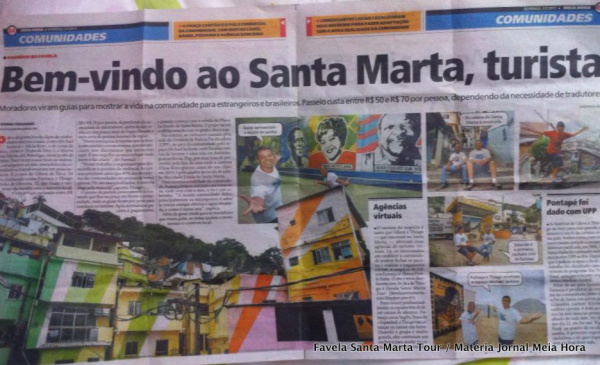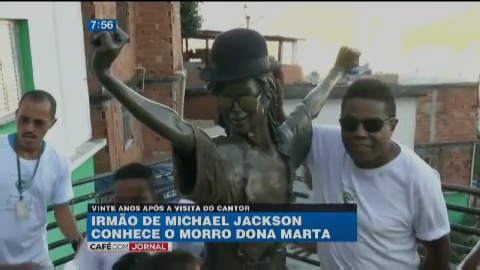Dona* Marta or Santa* Marta?
The name for Santa Marta favela comes from the first mass ever to be ministered by Father Velloso, who after climbing to the top of the hill where it is located, remembered a biblical passage:
“I climbed to the top of that hill. Back then, there weren’t a lot of houses down here. We used to have the mass where today is the little chapel . I said: ‘here is going to be the retreat for Our Lord to rest. Like Saint Martha, who was a homemaker in Palestine and received Jesus in her house when He waswere tired. So here we are going to do the same thing. Here is going to be the residence of Saint Martha, and she will be this place’s patroness .” - Father Velloso.
Authorship: Simone Lopes/Eco Group (Santa Marta).
Translated by: Lidiele Nogueira
Review: André Rezende Broseghini and Junia Zaidan
About[editar | editar código-fonte]
The name for Santa Marta favela comes from the first mass ever to be ministered by Father Velloso, who after climbing to the top of the hill where it is located, remembered a biblical passage:
“I climbed to the top of that hill. Back then, there weren’t a lot of houses down here. We used to have the mass where today is the little chapel . I said: ‘here is going to be the retreat for Our Lord to rest. Like Saint Martha, who was a homemaker in Palestine and received Jesus in her house when He waswere tired. So here we are going to do the same thing. Here is going to be the residence of Saint Martha, and she will be this place’s patroness .” - Father Velloso.
So is it Dona or Santa? Although the Santa Marta neighborhood is located in a hill called Dona Marta, residents did not care about it - they would refer to themselves as residents of Santa Marta Besides, nobody living downtown has any interest or worries about this part of the city, let alone what it is called.
Around 1930, Father Velloso gave that name and it was officially registered in 1965 as “Association of the Residents of Santa Marta’s Hill”. The document empowered and gave visibility to the discussions about the structural improvements in the favela.
The excerpt from the Association’s statute below leaves no doubts:
Art.1º - The Association of the Residents of Santa Marta’s Hill was founded on October 24, 1965.
Art.2º - It can be recognized by its full name Association of the Residents of Santa Marta’s Hill or by the initials A.M.M.S.M (Associação dos Moradores do Morro de Santa Marta).
However, everything started to get confusing when, in 1987, media outlets were discussing the drug war that was going on in the favela between Zaca and Cabeludo factions, They would publish their headlines calling the place “Dona Marta ”, after the hill’s original name. As always, they did not care about the people that lived there, but only worried about exposing the war and where on the map it was, which coincidentally was Santa Marta hill.
From then on, the residents' fight for their identity and history began against mass media and some residents who accepted the imposition from the means of communication and religion.
But they finally had a win on November 12, 2007, when Cesar Maia, the mayor back then, registered, at the City’s Official Journalr, the difference between Dona Marta Hill and Santa Marta Favela, the last one so full of life and stories of survival and struggles, besides its vibrant culture present in the veins of the residents.
The full Journal entry taken from Jus Brasil’s website
(https://cm-rio-de-janeiro.jusbrasil.com.br/legislacao/292070/decreto-28674-07)
Decree No. 28674 from November 12, 2007.
THE MAYOR OF RIO DE JANEIRO, in the use of legal attributions and, CONSIDERING that the question regarding the names emerged due to the Dona Marta lookout , a tourist attraction at the top of the hill.
CONSIDERING that the Dona Marta Hill was named, as a tribute, after Dona Marta Figueira de Mattos, mother of vicar Dom Clemente José de Mattos, landlord in the 17th century of the São Clemente esatet, in Botafogo, whose lands would go all the way to the Rodrigo de Freitas Lagoon. There, Dom Clemente opened paths to the São Clemente C hapel, that he built him self - a path that is now São Clemente street; and CONSIDERING that the favela is called Santa Marta because of a statue of Saint Martha located inside a chapel in the uppermost part of the favela. This statue was taken there by an old resident at the beginning of the 20th Century. When Father Veloso arrived in the 1930s, this little chapel was built to house the mentioned statue , sealing the name of the place, DECREES THAT:
Art. 1st Respecting tradition and history, based on the considerations of this Decree , the name of the hill on São Clemente street is DONA MARTA and the name of the favela is SANTA MARTA.
Art. 2nd This Decree is valuable from its publication date.
Rio de Janeiro, November 13, 2007 - 443rd of Fundação da Cidade,
Signed by.: CESAR MAIA.
But the struggle for individualization is not over. Many media outlets and diligent journalists are used to referring to the favela as Santa Marta, even though sometimes it’s referred to as Dona Marta in the subtitles, but the biggest struggle is with some residents who keep calling it Dona Marta, to avoid the word “saint” for religious reasons. It is sad when that happens, so now I ask: Do you go to the city of São Paulo [Saint Paul] or Sr. Paulo [Mr. Paul]? Do you go to the neighborhood of Santa Teresa [Saint Teresa] or Dona Teresa [Lady Teresa]? There are so many other places in Brazil with Santo and Santa in their names.
Why does Santa Marta have to be different?
How do you feel when someone gets your name wrong? Changing the name of Santa Marta is like erasing its history, its identity, and the memory of all of the people that fought hard battles to survive, to stay at the place, to have better living conditions, and for all their rights like any regular citizen in the world.
*Santa = Saint in English.
*Dona = Lady in English.


